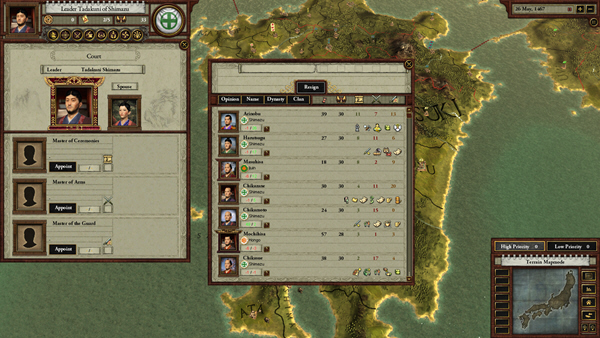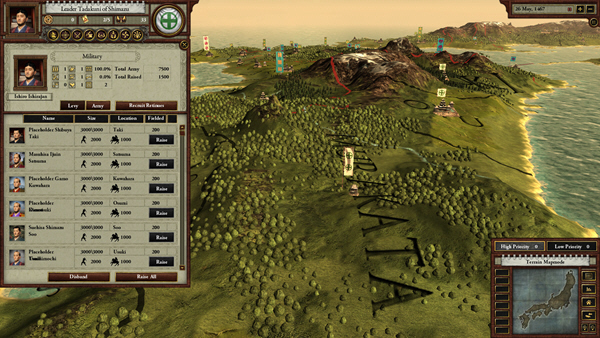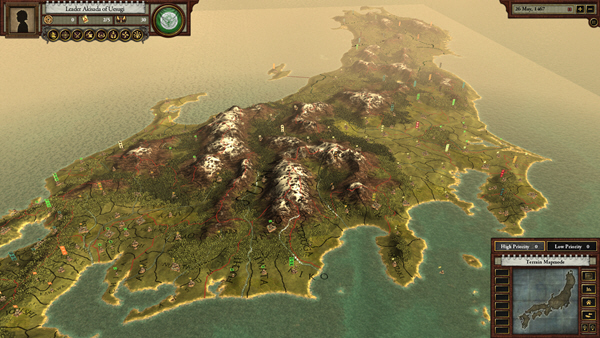Sengoku – PC Game Preview
 Sengoku. PC Game Preview. Publisher: Paradox Interactive. Developer: Paradox Interactive.
Sengoku. PC Game Preview. Publisher: Paradox Interactive. Developer: Paradox Interactive.
With Sengoku, Paradox Interactive turns the attention of its Europa Universalis system to the two-hundred year struggle between clans to establish the Shogunate of Japan. Despite similarities in interface and gameplay with adjustable day-by-day time, this new game is quite different from its world-spanning predecessor.
One Empire, Many Rulers
Sengoku concentrates on one nation, not on continents. The central unit of play is the clan, not a nation state. Players take the role of the head of one of over forty clans. In the campaign game, players play through generations of clan leaders while two shorter scenarios cover wars allowing two powerful clans to fight things out. Controlling half of Japan’s provinces wins the campaign game. Loss of honor down to zero allows the player to commit seppuku and lose the game.
{default}Clan leaders are besieged on three fronts. Rival clans will mount military operations, send ninja to assassinate key people and sow dissent. Domestically, a bad harvest or mobs whipped up by dissatisfied religions can cause the loss of honor. However, the most insidious threat may come from the clan itself. Clan leader is an elected position. Vassals and family members may plot to oust the leader or its heir in favor of their own favorite.

This hornet’s nest of threats can be tackled first at home. Vassals can be appointed to three positions: Master of Arms, of Ceremony, and of the Guard. Given that the appointees have high enough scores for seven skill levels in various traits, these courtiers can improve buildings, raise taxes, carry out intrigue and diplomacy while waging war. Promoting guilds opens the short tech tree. Appointments cost honor points but losses are more than recouped through a better exchequer, happier peasants, and diplomatic coups. Further honor comes from marrying well, having sons, winning battles, and giving money to the emperor.
Military affairs will be familiar to Paradox gamers. Peasant levies are the mainstay of the army but ronin can be hired to stiffen a force. Gunpowder weapons may become available late in the game if the Portuguese are friendly. Combat is abstract and automatic, determined by morale, army strength, and the mix of how competent the generals are. Enemy capitals can be besieged or stormed. Brute force isn’t the only way to take a province. Ninja clans can be hired to do a variety of missions such as assassinations, kidnapping, disgracing an enemy, and defending the clan. Diplomats can sow dissent, give gifts, exchange hostages, and get a honorable peace. All diplomatic actions require large amounts of honor, the real currency of the game.

Religion plays an unusual role. The leader starts with no religion and can choose between Shintoism, Buddhism, and Christianity. Joining any gives unique bonuses and improves relationships with other like-minded leaders. However, the downside is that money must be spent before being accepted by any denomination and attaching a leader to one faith will antagonize the other two. A strategy is not to join any but keep on the good side of all three by buying buildings for each.
Cherry Blossom Time
One is struck by the Sengoku’s graphics. The 3D terrain map of the Japanese islands is the most impressive map from Paradox yet. Zoomed out, the snow-capped mountains are visible; zoomed-in, rivers run past small villages. The other seven maps detail provinces, ownership of desmans, diplomatic relations, religions, and other clan leaders. Zoomed-in armies fight animated battles with soldiers in lacquered armor hacking at each other. Golden tracks show the movements of forces. Drop-down menus are very attractive with fine portraits of vassals, spouses, and heirs. Province menus have illustrated clan insignia guilds and buildings. Clear mouse tooltips help ease the learning curve. Music is not intrusive.

Sengoku looks to be an interesting variation on Paradox’s usual theme. The emphasis in the other titles is on country with dynasty an important secondary theme. This game reverses that structure, forcing mental gymnastics on long-time players of Paradox titles. The finished version should be invaluable for students of the Orient and should interest other gamers.
About the Author
Jim Cobb has been playing board wargames since 1961 and computer wargames since 1982. He has been writing incessantly since 1993 to keep his mind off the drivel he deals with as a bureaucrat. He has published in Wargamers Monthly, Computer Gaming World, Computer Games Magazine, Computer Games Online, CombatSim, Armchair General, Subsim, Strategyzone Online, Gamesquad and Gaming Chronicle.

